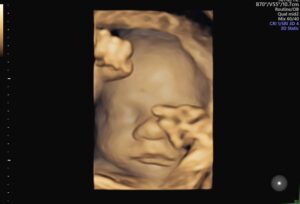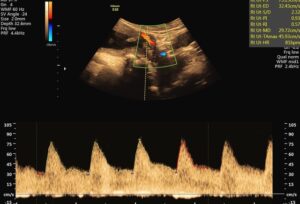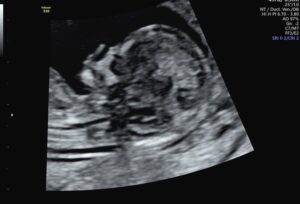SERVICES
GYNECOLOGY
Gynecological prevention
We recommend regular gynecological check-ups from the age of 20. This involves an examination of the abdomen and breasts and a cancer smear is taken from the cervix.
For most women, it makes sense to have a routine check-up once a year. Additional examinations or treatments can be carried out immediately if there are any abnormalities.
Cancer screening smears for women without particular risk factors are covered by basic insurance every three years. For patients with corresponding supplementary insurance , they are normally covered annually. HPV-Testing is only covered if the PAP-smear is suspicious.
Family planning and contraception
Nowadays, women, couples and families have very individual life plans.
This is also reflected in family planning and the wish for good individual contraception.
We would like to find a suitable contraceptive method together with you, that takes into account your individual wishes and expectations- and at the same time meets modern medical criteria.
Breast diseases
We recommend regular breast self-checks. The best time for pre-menopausal women to do this is in the days following their period. Pain, changes in the skin, secretions from the breast or lumps in the breast should be clarified. If there are any changes in the breast , we can offer you professional ultrasound examinations . If necessary , we will refer you to radiology or a breast center for further examinations.
As breast cancer is the most common malignant disease in women, all women between the ages of 50 and 70 should undergo regular screening examinations. Depending on the patient ‘s medical or family history, this can also be useful at a much earlier stage.
Consultation for teenagers
For girls and young women before the age of 20 most questions relate to the topics of menstruation, hygiene, HPV-vaccination, sexuality, relationships and contraception. We will be happy to advise you, a physical examination is often unnecessary.
Should a gynecological examination be necessary , we will discuss the procedure in detail and give you enough time to prepare for it.
Disorders of the menstruation cycle
Menstrual cycle disorders can have very different causes. Some women have had difficulties since early adolescence, others may develop them in the course of their lives.
For example, the cycle may be too short, too long, too irregular, the bleeding too heavy or too light. Many women also suffer from pain around their period. Endometriosis , for instance, can be a cause. But not every disorder is necessarily dangerous. We take a close look at your concerns and look for therapies that meet your needs.
Incontinence and pelvic floor problems
Many women develop pelvic floor problems in the course of their lives as a result of severe stress, pregnancies and childbirth or weakness of the connective tissue. This can lead to a disturbing feeling of pressure, but also to problems with bowel movements, during sex or urination.
Up to 40% of women also develop urinary incontinence, which shows itself in an involuntary loss of urine during physical stress or in a persisting strong urge to urinate. We have many years of experience in the diagnosis and treatment of prolapse and incontinence complaints and can advise and treat you well and individually .
Menopausal symptoms
Most women go through the menopause around the age of 50. Female hormone production decreases more and more. Bleeding disorders often occur and eventually the period stops altogether.
This time is often associated with major physical and emotional changes. We can support and advise you here and provide you with lifestyle tips and tricks, with herbal alternative therapies and, if necessary, with nature identical and classic hormone therapies.
Cancer follow-up care
Cancer is a drastic life-event. Fortunately , modern therapies and regular follow-up care have significantly improved the chances of complete recovery for our patients.
Regular check-ups are important after cancer treatment. This is not just about physical check-ups, but also advice and support when physical, emotional or partnership difficulties occur.
Gynecological operations/surgery
If surgery on the uterus, ovaries, vagina or breast is necessary we will be happy to advise you on the surgical options and find a suitable center / clinic for you.
Mr. Rudolf is also a specialist in “special operative gynaecology and obstetrics”(Title FMH). He can perform outpatient operations himself at the Bethanien Clinic in Zurich (patients of all insurance classes). Inpatient gynecological treatments and operations performed by him at the Bethanien Privatklinik Bethanien in Zurich are covered by semi-private and private insurances.
PREGNANCY AND OBSTETRICS
Pre-pregnancy counseling, unfulfilled desire to have children / sterility
We recommend counseling even before a planned pregnancy. This can minimize risks for the future pregnancy, and increase the chances of an uncomplicated course of pregnancy.
In the case of an unfulfilled desire to have children and the suspicion of infertility, we carry out the necessary diagnostics and basic therapies and, if necessary, support you in your search for a suitable fertility center.
Pregnancy checks
Fortunately, most pregnancies proceed without complications. In order to recognize risk factors and to be able to respond to possible complications at an early stage, regular check-ups are important for you and your growing child.
We are also happy to answer your questions about pregnancy and childbirth, nutrition, sport and various other topics.
Ultrasound /3D/4D
Today, ultrasound is one of the most important tools for monitoring pregnancy. Modern ultrasound equipment can produce very detailed images of the child, its face, organs, growth, and other markers that can indicate problems of the child and the mother. 3D or 4D sequences of the face or certain parts of the body can also be displayed.
Early pregnancy scan and pregnancy confirmation (7th-9th week of pregnancy)
- Early proof that the child is alive and in the right place in the uterus
- Determining the gestational age
- Recognizing multiples
- Assessment of the ovaries
First-trimester-screening (12th-14th week of pregnancy)
- Booking scan
- Exclusion of severe malformations
- Measurement of nuchal translucency and performance of the first trimester test to assess the risk of trisomy 21 and some other chromosomal disorders. We also screen all women on the risk of an early preeclampsia (pregnancy poisoning).
Second screening (21st – 24th week of pregnancy)
- Organ screening to exclude severe malformations
- Assessment of the amount of amniotic fluid, growth and nutritional status of the child
- Assessment of the length of the cervix
- Determination of the position of the placenta
Third screening (30th-33rd week of pregnancy)
- Control of growth and indirect nutrition parameters of the child
- Recognition of severe malformations that only become apparent in the course of development
The confirmation of pregnancy and the first and second screening are covered by basic insurance. Further ultrasound-examinations are also covered when complications occur or if there is a high-risk pregnancy.
-
PDF GermanPDF German
-
PDF AlbanianPDF Albanian
-
PDF EnglishPDF English
-
PDF FrenchPDF French
-
PDF ItalianPDF Italian
-
PDF PortuguesePDF Portuguese
-
PDF RussianPDF Russian
-
PDF Serbo-CroatianPDF Serbo-Croatian
-
PDF TurkishPDF Turkish
Prenatal diagnostics
In addition to the usual pregnancy checks and the recommended ultrasound examinations there are now various prenatal examination options for the child, for example to rule out genetic problems.
-
PDF Prenatal diagnosticsPDF Prenatal diagnostics
First trimester testing
The so-called first trimester test is part of the first “big” ultrasound during pregnancy and can be carried out between the 12th and 15th week of pregnancy. If the ultrasound examination was unremarkable ,the so-called nuchal translucency and the level of certain hormones in the mother’ s blood is measured. The results allows a risk calculation to be made, particularly for the presence of trisomy 21 (Down-Syndrome), the lesser known trisomies 13 and 18 and the risk for an early preeclampsia (pregnacy-poisoning).
If the first trimester test shows an increased risk of trisomy 21, 13 or 18 (higher than 1:1000), the basic insurance will cover another blood test (NIPT / see below) to rule out these genetic diseases. However, a normal risk in the first trimester test is not a 100% guarantee of a healthy child. The first trimester test is paid for by basic insurance.
NIPT (non-invasive prenatal testing)
The abbreviation NIPT means “non-invasive prenatal test”. This involves filtering out foetal cells from the mother’ s blood, which are then analysed for genetic problems. Various risks can currently be assessed using this procedure. The test is particularly suitable for ruling out trisomy 21 . The reliability of the test is over 99% . The test is less accurate for diagnosing trisomy 21, which is why , in the case of a high degree of suspicion invasive diagnostics are always recommended for confirmation (see below). NIPT should only be performed if the ultrasound findings are unremarkable . If there is an increased risk in the first trimester test (see above) , the NIPT is paid for by basic insurance, otherwise it is a private service.
Link www.prendia.ch
Invasive prenatal diagnostics
The safest way to rule out or confirm genetic diseases in a child, is invasive diagnostics. Here, a thin needle is inserted through the mother’ s abdominal wall into the uterus to take a sample of either placenta cells or cells from the child ‘s amniotic fluid. This allows different diseases to be recognized very precisely. However, these examinations always carry a small risk of miscarriage, which is why they are only carried out with a good reason (for instance if there is a high degree of suspicion of trisomy 21 in the first trimester test or NIPT or in the case of known serious hereditary diseases in the family).
At GynPraxis Opfikon , we offer you the various ultrasound-screenings as well as the first trimester test and NIPT. If invasive diagnostics are useful, desired or necessary, we work together with various specialists who will carry this out for you.
Birth planning and birth
We will be happy to plan your birth with you, help you to find a suitable maternity clinic (see also “Links and PDFs”) and organize an aftercare midwife for you. Mr. Rudolf has many years of experience in attending births and performing cesarean sections and is also a specialist in “spec. Gynecology and Obstetrics” FMH. For patients with private or semi-private insurance status, Mr. Rudolf also offers to attend the birth or perform a cesarean section himself in the “Bethanien Private Clinic”
https://www.swissmedical.net/de/spitaeler/bethanien/geburtenabteilung
Unintended pregnancies
In case of an unintended pregnancy, we provide counseling on abortion in accordance with the legal provisions applicable in Switzerland. During the consultation , a vaginal ultrasound scan is performed first, to confirm the pregnancy and the gestational age. You can discuss your personal situation with us in a consultation . We provide you with information to support you in your decision-making process and, if necessary, arrange further external support services.
If you decide after the consultation decide to terminate the pregnancy after a sufficient period of reflection, we will initiate the necessary steps for a medical or surgical abortion.






